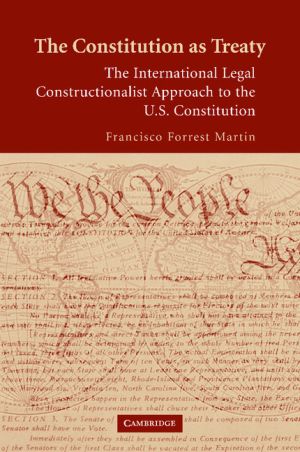
The Constitution as Treaty, first published in 2007, transforms the conceptualization of US constitutional law by exploring the interpretive implications of viewing the US Constitution as a treaty. It argues that federal courts constitute an international tribunal system, and, as such, their jurisdiction is governed by international law enabling them to exercise judicial review authority and undercutting much of the judicial activist critique. The Constitution as Treaty continues with an examination of what is international law and its major interpretive principles in order to set the stage for examining how different sources and principles of international law are intrinsically integrated into US constitutional law and, thereby, are available to federal courts for deciding cases. It addresses the Charming Betsy Rule, the non-self-execution doctrine, the last-in-time rule, and the proper use of customary international law and other international law sources not mentioned in Article III. The Constitution as Treaty concludes that federal courts generally must construe the United States' international legal obligations liberally.